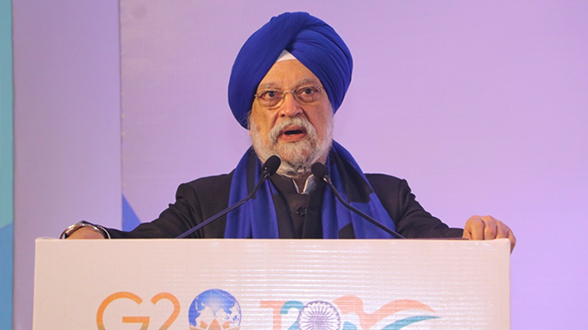Closing the convenings at the T20 India Inception Conference on Day 1, Hardeep Singh Puri, Minister of Petroleum and Natural Gas, and Housing and Urban Affairs, Government of India dissected why the Indian Presidency of the Group of Twenty (G20) is really ‘one of a kind’. Tracing back the journey of this fairly large inter-governmental forum to its establishment, he impressed that it certainly goes to the strength of the G20 to respond to critical global issues in collaboration, at times when international organisations and national governments fall short of it.
The G20, originally bringing together Finance Ministers and Central Bank representatives to discuss global economic and financial issues, was elevated to the Leader’s Level in response to the 2008 Subprime Mortgage Crisis and the global contagion. The congregation of Finance Ministers has now become an annual summit with Heads of State/ Government, who are at a pivotal position to address multitude crises.
The current G20 presidency is unique as India assumes the mantle when the world is once again confronted with a three-fold crisis across major sectors—Food, Fertiliser, and Fuel. Another important aspect of the Indian G20 Presidency, as highlighted by the Minister, is the spread and horizontal participation in this year’s convenings. This is different from previous summits as the Global South finds its voice and strength represented well under the Indian G20 Presidency.
While focusing on multilateralism, the Minister stated that the present system—the United Nations (UN) and the Bretton Woods Institutions—was conceived in a crisis; however, its basic design is at the most flailing. He added that one of the key pillars of the UN—peace and security—is now translated into five countries holding the mantle of peace with ‘veto’ power. The Security Council stands as the only authorised and designated entity in the global system that has the authority to determine whether there exists a threat to peace and security. Although the veto is a justified concept, the overall condition stands impaired. The Minister further questioned the functioning of World Trade Organisation during the Covid-19 pandemic, including its role in addressing the supply chain disruptions that directly threatened livelihoods around the world. The evidence of failures in such multilateral organisations form a potential space for think tanks to step forward and address those gaps.
What does the future look like in the present scheme of things? The Minister observed that the global energy challenges showcase a complete mismatch between those who talk about climate change and those who have to navigate through the energy crisis, given the unequal growth structures. He also emphasised the importance of addressing multilateral issues before the system shows cracks. He implored that the G20, and especially the Think20, can be the platform to utilise the congregation’s expertise and their vantage position in think tanks to strike a serious dialogue on what needs to be done.
Hardeep Singh Puri also highlights that while there is definitely a need for identification of due responsibilities of countries towards addressing global issues, the world should also focus on taking the first step towards change. Through upholding mechanisms like the Polluters Pay principle, developing countries may hold the developed countries responsible for their actions, but they also have a duty to fulfil towards the next generations. He strongly insists that the obligations and commitments towards solving global crises are very serious in nature and nothing should shake that resolution.
Concluding the session, the Minister recommends that rather than looking for absolute reforms, countries should try to address the threats or challenges confronting the existing system. These systems should be made immune to the abuse of power and dominance. Can these subtle reforms of existing multilateral institutions work in the long run? The Minister acknowledges that the aspiration to create a reformed institutional mechanism is certainly more than diagnosing the issues in the existing setup.
Watch the full Address here.
This event report has been compiled by Debosmita Sarkar, Junior Fellow, CNED, ORF.




